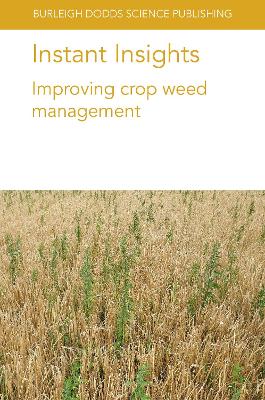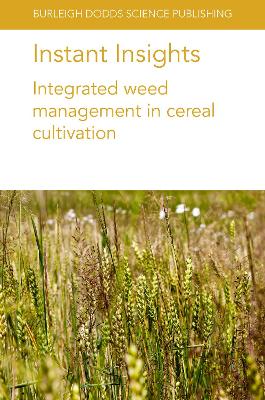Burleigh Dodds Science: Instant Insights
2 primary works
Book 37
This specially curated collection features five reviews of current and key research on improving crop weed management.
The first chapter highlights the need for alternative weed control strategies that will preserve herbicide efficacy, as well as agricultural and environmental sustainability. The chapter discusses the role of integrated weed management (IWM) in achieving this through the implementation of practices that can improve plant health, such as crop rotations and no-till farming.
The second chapter considers the use of IWM in barley cultivation. After an initial outline of more traditional control methods, primarily the use of herbicides, the chapter provides an example of the successful implementation of IWM in barley in the form of two case studies.
The third chapter reviews the impact of weeds on maize grown under temperate conditions in the United States and Europe. It provides a summary of current weed management systems and discusses the issue of herbicide resistance in weed varieties.
The fourth chapter reviews the use of IWM in rice cultivation for improved crop productivity and performance and offers detailed discussions on the variety of techniques that can be incorporated into an IWM strategy to achieve this.
The final chapter presents a number of weed management options and considerations for sorghum, and discusses the critical period for weed control to occur.
The first chapter highlights the need for alternative weed control strategies that will preserve herbicide efficacy, as well as agricultural and environmental sustainability. The chapter discusses the role of integrated weed management (IWM) in achieving this through the implementation of practices that can improve plant health, such as crop rotations and no-till farming.
The second chapter considers the use of IWM in barley cultivation. After an initial outline of more traditional control methods, primarily the use of herbicides, the chapter provides an example of the successful implementation of IWM in barley in the form of two case studies.
The third chapter reviews the impact of weeds on maize grown under temperate conditions in the United States and Europe. It provides a summary of current weed management systems and discusses the issue of herbicide resistance in weed varieties.
The fourth chapter reviews the use of IWM in rice cultivation for improved crop productivity and performance and offers detailed discussions on the variety of techniques that can be incorporated into an IWM strategy to achieve this.
The final chapter presents a number of weed management options and considerations for sorghum, and discusses the critical period for weed control to occur.
Book 55
This collection features five peer-reviewed literature reviews on integrated weed management in cereal cultivation.
The first chapter examines the problem of weeds in barley and explains the application of integrated weed management (IWM) to barley cultivation. The chapter also outlines weed control tactics and the practical implementation of IWM in barley.
The second chapter reviews the availability of cultural strategies which can be used in wheat cultivation as part of an IWM strategy. The chapter considers the implementation of practices that can improve crop health, including diverse crop rotations.
The third chapter considers the impact of weeds on maize cultivation and productivity, as well as the emergence of IWM as a sustainable method of controlling weeds. The chapter assesses the efficacy of key IWM techniques, such as crop rotations.
The fourth chapter provides a detailed assessment of the biological constraints currently impacting the productivity of rice cultivation, focusing on the issue of weeds. The chapter includes an overview of the IWM approach and its benefits.
The final chapter focuses on competitive cereal crops and cultural strategies for weed management, including the use of weed-suppressive cultivars, post-harvest crop residues, and cover crops for management of the weed seedbank and eventual weed suppression.
The first chapter examines the problem of weeds in barley and explains the application of integrated weed management (IWM) to barley cultivation. The chapter also outlines weed control tactics and the practical implementation of IWM in barley.
The second chapter reviews the availability of cultural strategies which can be used in wheat cultivation as part of an IWM strategy. The chapter considers the implementation of practices that can improve crop health, including diverse crop rotations.
The third chapter considers the impact of weeds on maize cultivation and productivity, as well as the emergence of IWM as a sustainable method of controlling weeds. The chapter assesses the efficacy of key IWM techniques, such as crop rotations.
The fourth chapter provides a detailed assessment of the biological constraints currently impacting the productivity of rice cultivation, focusing on the issue of weeds. The chapter includes an overview of the IWM approach and its benefits.
The final chapter focuses on competitive cereal crops and cultural strategies for weed management, including the use of weed-suppressive cultivars, post-harvest crop residues, and cover crops for management of the weed seedbank and eventual weed suppression.

